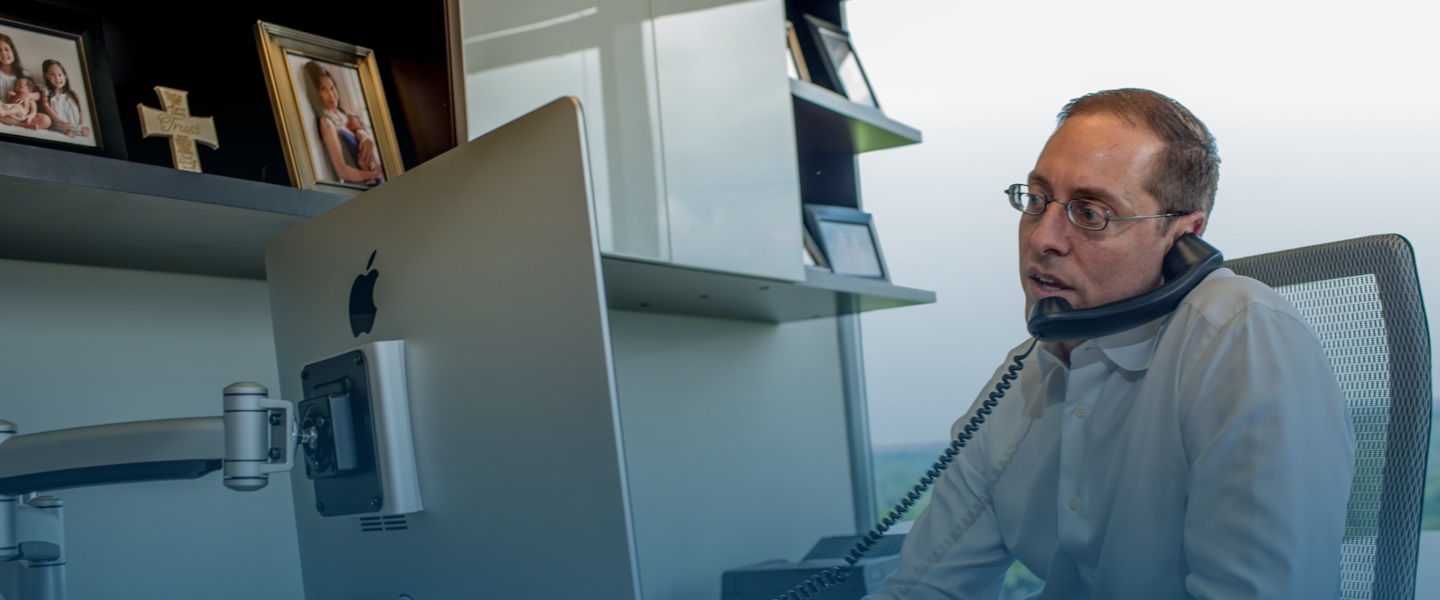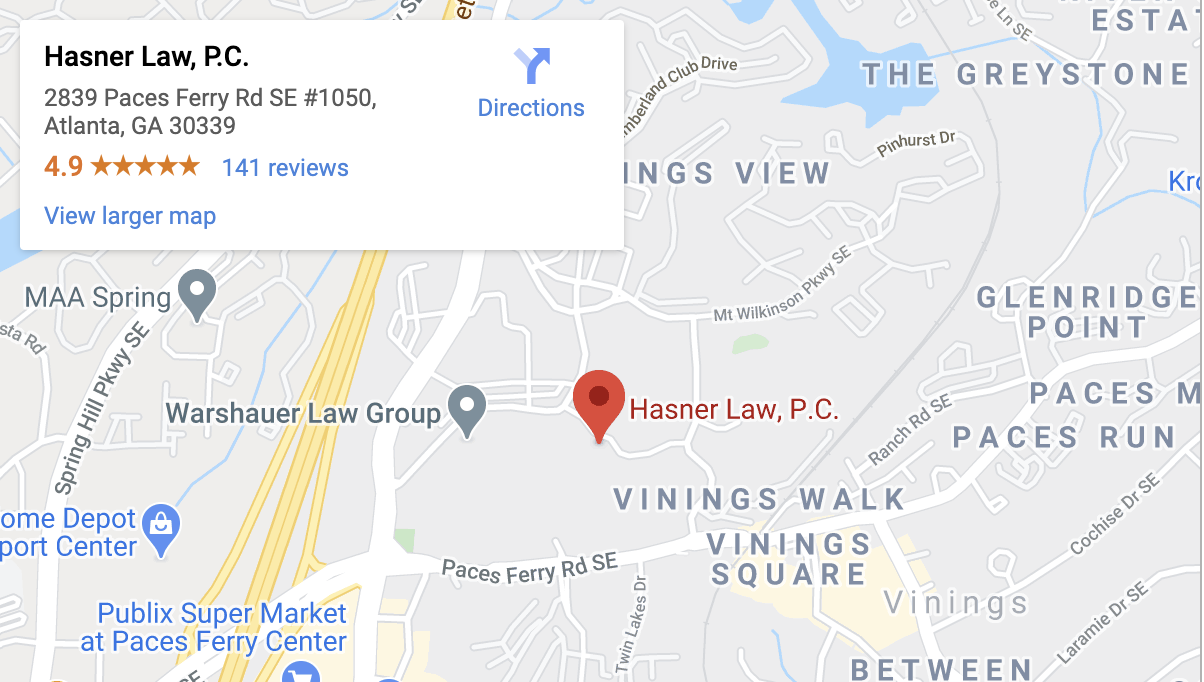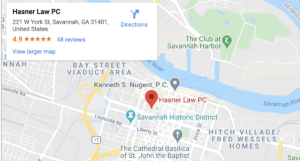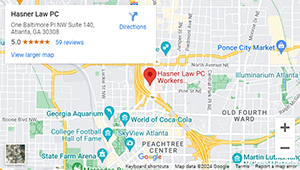A skilled Atlanta workers’ compensation lawyer can provide critical support needed after an injury on the job. In 2019, the U.S. Bureau of Labor Statistics reported over 78,000 non-fatal workplace injuries in Georgia alone.
Although the system is intended to support injured workers, it is often controlled by insurance companies focused on limiting payouts rather than your well-being. A workplace injury can seriously affect your health and create financial uncertainty for your family.
You don’t have to face the challenges of a workers’ comp claim by yourself. An experienced workers’ compensation attorney can advocate on your behalf and help you pursue the benefits you may be entitled to.
Call Hasner Law PC today at 678-888-HURT (4878) for a free and confidential case evaluation.
Atlanta Workers’ Compensation Guide
- Why You Need a Workers’ Compensation Lawyer in Atlanta
- Understanding Workers’ Compensation Law in Georgia
- Types of Workers’ Compensation Benefits in Georgia
- What to Do After a Workplace Injury in Atlanta
- Common Workplace Injuries in the Atlanta Metro Area
- What to Expect During a Workers’ Compensation Claim in Georgia
- When Workers’ Compensation May Not Be Your Only Option
- FAQs for Atlanta Workers’ Compensation Lawyer
- Contact an Atlanta Workers’ Compensation Attorney Today
Why You Need a Workers’ Compensation Lawyer in Atlanta
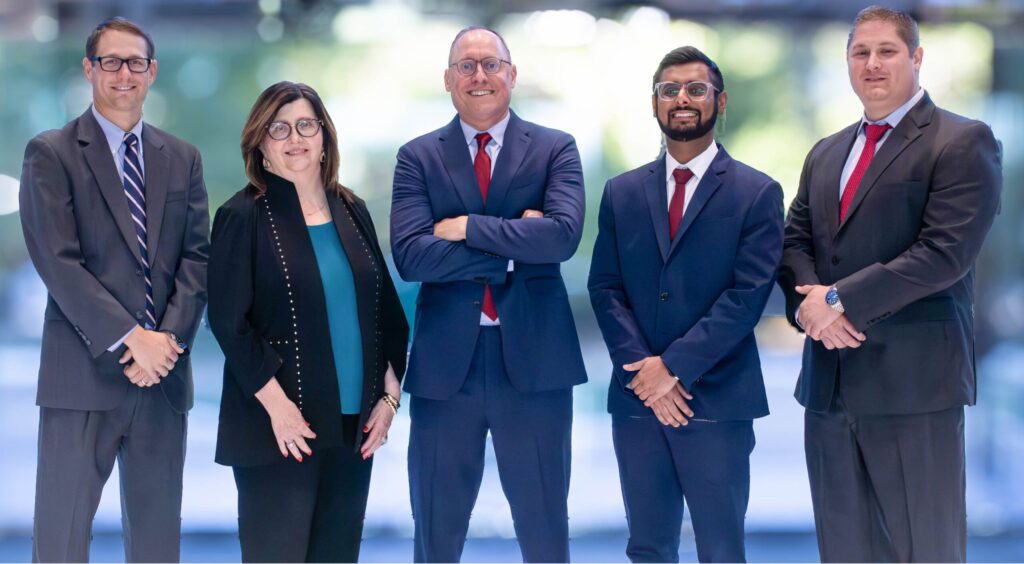
A workplace accident in Georgia can impact your health, disrupt your income, and limit your access to necessary medical treatment. An experienced Atlanta workers’ compensation lawyer can help you manage these challenges and protect your right to benefits.
When you file a claim, you are up against large insurance companies that process thousands of cases annually. These companies are supported by teams of adjusters, nurses, and attorneys who work to limit the compensation they provide.
At Hasner Law, we are committed to standing with you. Our role is to safeguard your legal rights, guide you through every stage of the claims process, and ease your burden so you can focus on your recovery and your family.
How Hasner Law Helps Injured Workers in Atlanta
As soon as you hire an attorney from Hasner Law, we take immediate action on your behalf. We inform your employer and their insurance carrier that you are now represented by our firm.
From then on, all communication goes through our office. You will no longer have to manage persistent calls or feel pressured to give a recorded statement that could jeopardize your claim.
Our legal team conducts a detailed investigation into your accident and injuries. We collect critical evidence such as incident reports, witness accounts, safety records, and equipment maintenance logs.
We explain Georgia’s medical treatment rules and guide you through selecting a doctor from the Panel of Physicians. We prepare and submit all necessary paperwork to the State Board of Workers’ Compensation, including key forms like Form WC-14, and we make sure all deadlines are met.
We track your weekly income benefits to ensure timely and accurate payments. If the insurance company attempts to delay treatment, cut benefits, or suspend your checks, we take swift action to protect your interests.
With more than 80 years of combined legal experience, our attorneys understand the strategies insurers use to reduce or deny claims. We use that insight to advocate for the full benefits you deserve from start to finish.
Understanding Workers’ Compensation Law in Georgia
Your rights as an injured worker in Georgia are governed by the Georgia Workers’ Compensation Act, found in O.C.G.A. Title 34, Chapter 9. This law established what is known as a no-fault system, meaning you generally do not have to prove your employer was negligent or responsible for your injury in order to receive benefits.
However, no-fault does not mean that every injury is automatically covered. To qualify, the injury must arise out of and occur during the course of your employment.
Some injuries, such as those caused by intoxication, horseplay, or intentional misconduct, are generally not covered. An attorney can help determine whether your circumstances fall within the law’s coverage.
In most cases, workers’ compensation is the exclusive legal remedy available to injured workers. This means you usually cannot file a separate lawsuit against your employer for a job-related injury.
Claims and disputes are handled through the State Board of Workers’ Compensation, which oversees the administration of benefits, hearings, and appeals.
2025 Legislative Update: Georgia Senate Bill 321
Georgia Senate Bill 321 was enacted to address coverage issues for certain classes of workers whose employment may involve overlapping federal and state regulation. If you work in a federally governed field, such as maritime transport, interstate trucking, or the railroad industry, this law could affect your eligibility for state workers’ compensation benefits.
If you are unsure whether your job is covered under federal law, it is important to consult an attorney who can explain how recent legislation may apply to your situation.
Types of Workers’ Compensation Benefits in Georgia

The Georgia workers’ compensation system provides three core types of benefits to support injured employees during their recovery. Unfortunately, insurance companies may not fully explain what you are entitled to or how to access it.
Medical Care and Treatment Costs
Your employer’s workers’ compensation insurer must pay for all authorized medical treatment related to your job injury. This includes visits with doctors and specialists, hospital stays, surgeries, physical therapy, prescription medications, necessary medical equipment, and mileage reimbursement for travel to and from your appointments.
You are not responsible for copays or deductibles. However, Georgia law generally requires you to choose a treating physician from your employer’s Panel of Physicians, which is a list of pre-approved doctors posted at your workplace.
Weekly Income Benefits
If your injury keeps you from working for more than seven days, you may qualify for income benefits that partially replace your lost wages.
- Temporary Total Disability (TTD): If your authorized treating doctor says you cannot work at all, TTD benefits may be paid at two-thirds of your average weekly wage, up to the maximum amount allowed by law.
- Temporary Partial Disability (TPD): If you return to a modified or light-duty job that pays less than your regular wages, TPD benefits may cover two-thirds of the difference between your previous and current earnings.
Permanent Partial Disability (PPD)
Once your doctor determines that you have reached Maximum Medical Improvement (MMI), they may assign a permanent impairment rating. This rating reflects the loss of function in the affected body part and is used to calculate how much you may receive in PPD benefits.
What to Do After a Workplace Injury in Atlanta
Your actions immediately following a workplace injury can significantly affect your claim. The law sets strict deadlines and procedural rules, so it’s important to act quickly.
Report the Injury to Your Employer
You must notify your employer as soon as possible after the injury occurs. Georgia law gives you 30 days to report the incident to a supervisor or manager.
Failing to do so could prevent you from receiving benefits. To create a clear record, it is best to report the injury in writing, such as by email or text message.
Seek Medical Treatment from an Approved Provider
Getting prompt medical care is essential for your recovery and for documentation. In an emergency, you may go to the nearest hospital.
For non-emergencies, you must receive treatment from a provider listed on your employer’s Panel of Physicians. Seeing a doctor not on the approved list could jeopardize your claim.
File Form WC-14 with the State Board of Workers’ Compensation
Notifying your employer is not the same as filing a claim. You or your attorney must file Form WC-14 with the State Board of Workers’ Compensation to officially begin the process.
This must be done within one year of the date of injury. Missing the deadline could result in a loss of benefits.
Common Workplace Injuries in the Atlanta Metro Area

Atlanta’s workforce spans diverse industries, each with its own risks. At Hasner Law, we assist workers across Fulton, DeKalb, Cobb, and Gwinnett counties.
- Construction Workers: Common injuries include falls from ladders or scaffolding, equipment accidents, and overexertion.
- Warehouse and Logistics Employees: These workers often suffer injuries from lifting, forklift incidents, or falling objects.
- Healthcare Professionals: Nurses and other healthcare workers often suffer injuries from lifting patients or slipping on wet or uneven floors.
- Office and Retail Employees: Repetitive stress injuries, lifting accidents, and falls are common in these roles.
No matter your job title or industry, if you were injured while performing your job duties, you may be eligible for workers’ compensation benefits under Georgia law.
What to Expect During a Workers’ Compensation Claim in Georgia
If you’ve been injured at work, understanding the general process can help ease some of the uncertainty. While each case is unique, most follow these key steps:
1. Reporting Your Injury
You must report your accident to a supervisor or manager within 30 days. Failing to do so can result in the loss of benefits. Whenever possible, submit your notice in writing.
2. Choosing an Authorized Doctor
Unless it is an emergency, you must seek care from a doctor listed on your employer’s Panel of Physicians. This is the first step in establishing your treatment and work restrictions.
3. Filing a Formal Claim
Submitting Form WC-14 to the State Board of Workers’ Compensation starts the official claim process. This must be done within one year of your injury.
4. Receiving or Contesting Benefits
You may begin receiving benefits if your claim is accepted. If denied, you can request a hearing before a judge to present your case.
5. Monitoring Your Case and Benefits
Your income benefits and medical care will be monitored for accuracy. If issues arise, such as delayed checks or denied treatment, your attorney can take prompt action.
6. Case Resolution or Settlement
Some cases may end with continued weekly benefits, while others involve negotiated settlements. Your attorney will guide you through this based on your long-term needs and medical status.
When Workers’ Compensation May Not Be Your Only Option

While workers’ compensation typically prevents you from suing your employer directly, you may have other legal options depending on how your injury occurred.
You may be able to pursue a separate personal injury claim if one of the following applies:
- Your injury was caused by a third party, such as a subcontractor, vendor, or delivery driver.
- You were injured due to a defective product or machine, such as faulty equipment or unsafe tools.
- You were hurt while working at a location not owned or controlled by your employer, such as a job site maintained by another company.
- You were injured in a work-related vehicle accident caused by another driver.
These types of claims can allow for additional compensation beyond what workers’ compensation provides, including pain and suffering. If you’re unsure whether your situation qualifies, Hasner Law can evaluate your case at no cost.
FAQs for Atlanta Workers’ Compensation Lawyer
What if my employer tells me not to file a claim?
It is unlawful for your employer to retaliate against you for filing a workers’ compensation claim. If you are being pressured or discouraged from reporting your injury, it is important to consult with an attorney as soon as possible. Taking early action can help protect your right to benefits and may prevent any adverse consequences at work.
What happens if my claim is denied?
A denial is not the end of your claim. You have the right to request a hearing before a judge at the State Board of Workers’ Compensation, where you can present medical records, witness testimony, and other supporting evidence. Because this is a formal legal proceeding, working with an experienced attorney can help you navigate the process and prepare a stronger case.
Do I have to return to work if I don’t feel ready?
Only your authorized treating physician can determine when you are medically able to return to work. If your doctor clears you for light-duty work and your employer offers a job that meets those restrictions, you are generally required to attempt that position.
Declining suitable work without a valid reason could put your income benefits at risk, so it is important to understand your medical limitations and legal obligations before making that decision.
Why did my weekly checks stop unexpectedly?
There are several reasons your benefits might stop, including a release to full-duty work by your doctor or the insurance company submitting paperwork to suspend payments.
If you are unsure why your checks stopped, contacting a workers’ compensation attorney right away is the best way to understand your rights and determine whether the action was legally justified.
Do I have to pay taxes on workers’ compensation payments?
In most cases, workers’ compensation benefits are not considered taxable income under Georgia or federal law. This includes both weekly payments and most types of settlements.
However, if your settlement includes components beyond compensation for your injury, such as interest or damages from other claims, there may be tax consequences. Discussing the structure of your settlement with an attorney can help you avoid unexpected financial issues.
Contact an Atlanta Workers’ Compensation Attorney Today

If you have been injured on the job, you may suddenly find yourself navigating a system that feels confusing and one-sided. Insurance companies are backed by professionals whose job is to protect their bottom line, not yours.
During this difficult time, you deserve someone who is focused on protecting your rights and guiding you through the legal process with care and experience.
At Hasner Law, we understand how a work injury can affect every part of your life. From the pain of recovery to the stress of lost wages and mounting bills, we know the challenges you are facing. We handle the legal process so you can focus on recovering and being with your family.
We are ready to listen, answer your questions, and help you move forward with confidence. Contact our Atlanta office today at 678-888-HURT (4878) to schedule a free consultation with no obligation.
Hasner Law: Atlanta Injury & Workers’ Compensation Attorneys
2839 Paces Ferry Rd SE #1050
Atlanta, GA 30339

